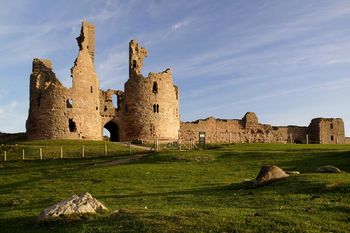Dunstanburgh Castle: Difference between revisions
Jump to navigation
Jump to search

imported>Richard Nevell (Add illustration) |
imported>Richard Nevell (A bit about the name) |
||
| Line 2: | Line 2: | ||
{{Image|Dunstanburgh Castle entrance, 2007.jpg|right|350px|The castle's main gatehouse}} | {{Image|Dunstanburgh Castle entrance, 2007.jpg|right|350px|The castle's main gatehouse}} | ||
'''Dunstanburgh Castle''' was founded by the Earl of Lancaster in the early 14th century. The ruins are now open to the public. | |||
==History== | |||
The name Dunstanburgh was thought to be a 14th-century creation, emulating the name of nearby [[Bamburgh Castle]] however it is now thought that the -''burgh'' suffix may refer to a previous fortification on the site. Archaeological investigations indicated that there was prehistoric or Roman activity on the site of the later castle, possibly an [[Iron Age]] promontory fort. By the time Dunstanburgh Castle was built, the area had been used as farmland for several centuries.<ref>Oswald, Alastair & Ashbee, Jeremy (2007). ''Dunstanburgh Castle''. London: English Heritage. p. 25. ISBN 978-1-905624-95-9.</ref> | |||
==References== | |||
{{reflist}} | |||
Revision as of 11:05, 6 April 2013
Dunstanburgh Castle was founded by the Earl of Lancaster in the early 14th century. The ruins are now open to the public.
History
The name Dunstanburgh was thought to be a 14th-century creation, emulating the name of nearby Bamburgh Castle however it is now thought that the -burgh suffix may refer to a previous fortification on the site. Archaeological investigations indicated that there was prehistoric or Roman activity on the site of the later castle, possibly an Iron Age promontory fort. By the time Dunstanburgh Castle was built, the area had been used as farmland for several centuries.[1]
References
- ↑ Oswald, Alastair & Ashbee, Jeremy (2007). Dunstanburgh Castle. London: English Heritage. p. 25. ISBN 978-1-905624-95-9.
